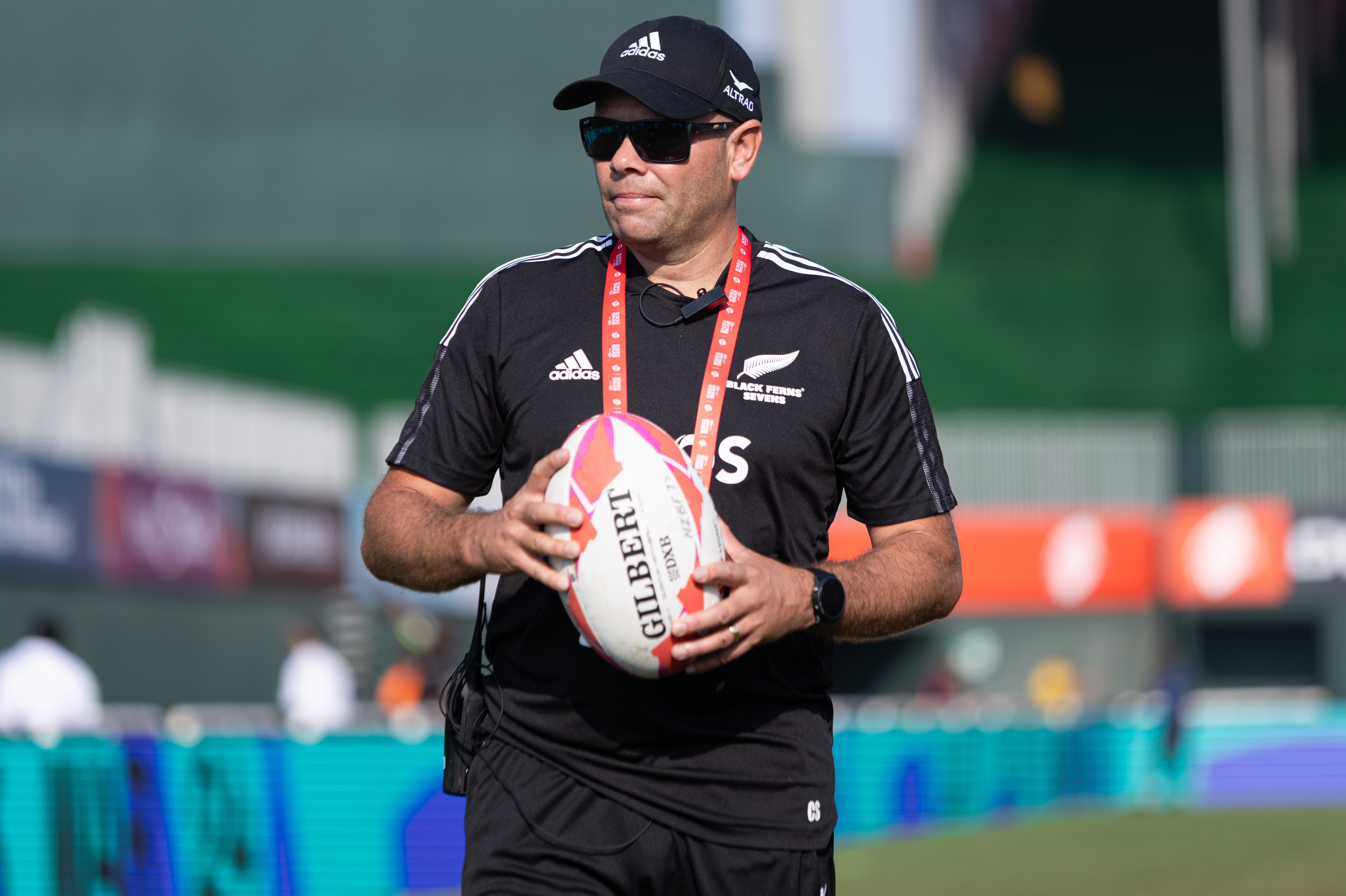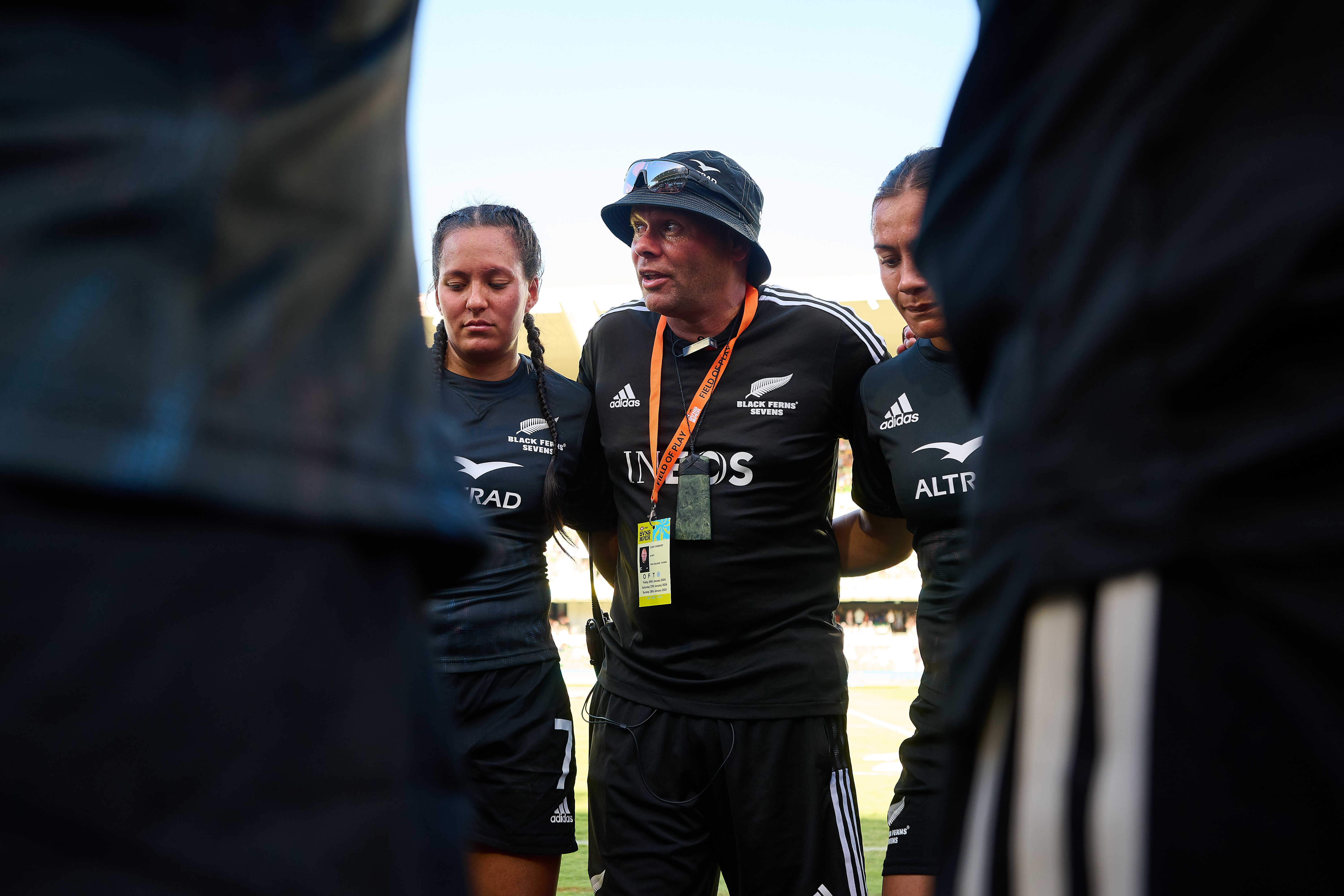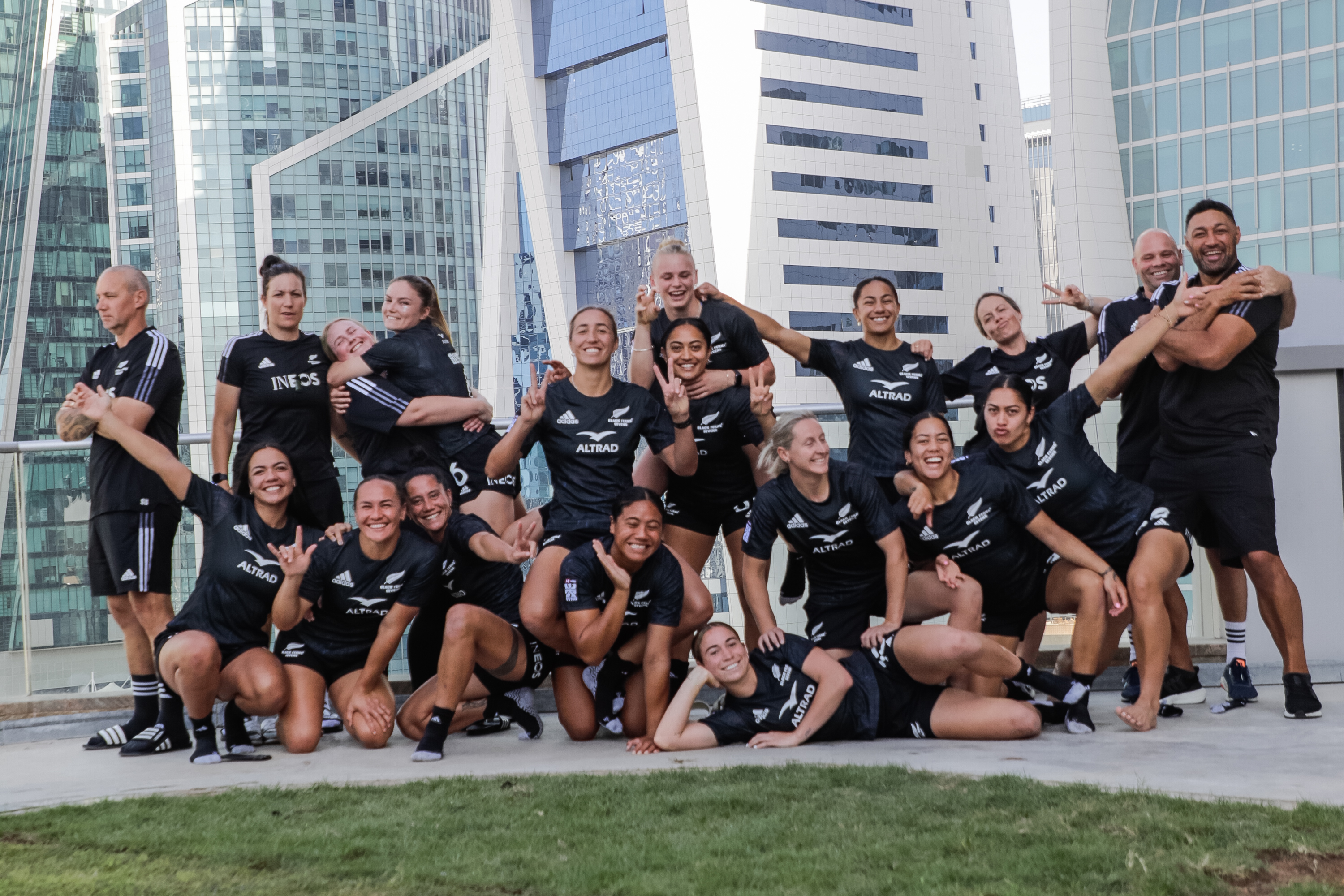Cory Sweeney
Cory Sweeney
- Coach Profile
Savouring the moment is often a short-lived experience for Cory Sweeney, who instead, spends much of his time looking ahead and plotting the course of continued success for the Black Ferns Sevens.
From Black Ferns assistant coach (2016 – 17) to Black Ferns co-coach (2019 – 2021) to Black Ferns head coach (2021 – present), Sweeney, initially thought the closest he could get to being involved with the Black Ferns Sevens programme was as their manager. But coaching has always been his true calling as evidenced in the remarkable career he has fashioned from the mentor’s role.
Sweeney put the stamp on his credentials when in his first Olympic campaign as head coach, steered the Black Ferns Sevens to back-to-back gold medals to ignite New Zealand’s rush of medals at the 2024 Paris Games.
“Paris was a really special moment, there’s no doubt,” said. “There are moments along the way which are just as powerful, but I think that moment (Paris) is just a very, very intense 60 seconds of your life……. when that final whistle goes that emotional feeling that you get of pride, connection to your players, relief in some ways, was exceptionally intense.
“That’s the feeling you crave as a coach and that’s what you strive for, but it doesn’t last very long, so you’ve got to enjoy it when you get there.”
Starting his coaching odyssey as a player/coach in 15s, the rise of sevens drew Sweeney to coach both formats with more involvement in the shortened version of the game increasing along the way.

“Coaching the Black Ferns Sevens was something I thought was out of reach,” he said.
“Prior to joining this team, I actually applied for the manager’s role and was unsuccessful. I wasn’t sure whether I was going to be good enough to coach the Black Ferns Sevens or whether there was even going to be an opportunity for me to find my path to a job like that.
“But once I had a sniff and had an opportunity to coach both men and women (in Tauranga), I gave it everything I could and learnt as fast as I could and tried to be the best coach I could be for those two teams in the lead-in to 2016.

“As I grew, the connection grew, and the belief in myself grew, I certainly aspired to be the Black Ferns Sevens head coach and I’m extremely grateful for the last eight years I’ve had in this team and certainly the last three as head coach as well which has been a dream that I’d had for a fair while.”
Sweeney started his professional working career as a teacher after gaining a Bachelor of Teaching, Physical Education Teaching and Coaching at Waikato University.
“I think that maybe the thing that forced me into coaching early was I probably wasn’t as good a player as I wanted to be,” he said. “And so, while I was playing the game, I felt I could read the game and teach the game quite well around the skillsets I had of wanting to be a great player but also the education piece which I found complimented being a coach.”
Sweeney fell into a player/coach role early in his playing career and alongside his teaching carried on that path when spending seven years overseas in Japan and England.
He took up a job with the North Harbour Rugby Union as its Rugby Development Officer on returning home which formally kick-started his professional coaching career.
Returning to the Bay of Plenty, sevens rugby slowly became a more prominent feature in Sweeney’s coaching resume.
“Sevens was always a part of what I did but just a summer sport that I coached or played,” he said. “It was always there but as I went through my coaching career in Tauranga, I coached Tauranga Sports Rugby Club for four years. We didn’t actually have a sevens team, and I wanted to put a team in the local competition, so I started up a boys’ sevens team at Tauranga Sports and that was exciting.”
He then introduced his good friend Allan Bunting, who was the assistant coach of the Black Ferns Sevens at the time, to his set-up, to provide some skill coaching for both the women and men’s teams.
“And that was where the real love and passion of sevens started to grow for me and I did start to have pathways and opportunities to coach players that I was working with, both in Tauranga and slightly further away in Hamilton,” Sweeney said.
Not long after, in 2016, Sweeney became Black Ferns assistant coach before joining Bunting as the team’s co-coaches in 2020, a partnership that worked seamlessly and delivered plenty of success, including the World Seven Series and the team’s first Olympic gold medal at the Tokyo Olympics.
“Allan and I went to school together, have known each other since Standard 3. We played all our sport together, we grew up together, we were best mates, we lived at each other’s houses during summer and outside of school hours,” Sweeney said.
“We were mates first and knew each other pretty well, so when we started working together, we’d already got to a pretty quick level of trust, respect and understanding of each other.
“A good way to summarise Allan and myself is probably head and heart. And while we both have skillsets across both of those, Allan was a really great connector of people, he had really strong relationships with all the players.
“And the bit that I added, I was probably a bit more process-driven about how we navigated things and how we arrived at certain places, so we complemented each other really well, knew what each other’s strengths were and bounced off each other.
“And for whatever reason, we got the most out of the group, we were successful, and we enjoyed ourselves along that journey, so it was a really special five years with him.”
Bunting stepped down after the 2021 Tokyo Olympics and Sweeny was confirmed as the Black Ferns Sevens sole head coach later that year. Following the Covid 19-enforced lockdown, New Zealand returned to the sevens circuit in 2022.
“Winning pinnacle moments are what, externally, people view as outcome or achievement, so Paris (Olympics) was a special moment for everybody involved,” he said.

“The journey to get there…. there was no question, there was a hangover after Tokyo. When people go and win an Olympic gold medal, it takes time to bounce back from that and we had pinnacle events looming the following year.
“We won bronze in the Commonwealth Games and silver in the World Cup but that was certainly below expectation and below what this group were capable of, so we really had to regroup and grow some young talent and balance that with all the quality, experienced players that we had in that group.
“That journey was like a roller coaster. Every cycle is like that where you have your wins and your losses and you learn from them. We learnt pretty quickly, and I guess the end result of that was a strong performance in Paris where we got a lot of things right.
“But well beyond the gold medal was the way in which the group inter-acted, the entire squad and the way in which we impacted communities and people that were watching the game, and the way in which they spoke about us rather than the performance, was probably the highlight for me when reflecting on those three years.
“Those sorts of elements in a team are hugely crucial. We spoke a lot about the power of the group and we did things together, so it was never about one person, it was never coach-led, it was never player-led, it was the whole of management and players, players that were in Paris, and players that stayed at home, all played a massive role.
“The environment we created at home was so competitive that by the time we got to the world stage we’d already been to war, so we were comfortable with whatever was going to get thrown at us in Paris because we’d done it so many times at home in the lead-in.
“The culture, the environment, the habits that we created and the way in which we interacted with each other, was certainly way more powerful than the game of rugby we were playing.”
Evolving as a coach during his eight years with the Black Ferns, Sweeney believes there is no different approach needed for coaching women as compared to men.
“I would like to think that whether I was coaching men or women I would evolve to what was required for whatever group I was coaching,” he said.
“I do think, however, that there’s a real intense emotional connection involved with a women’s programme, and I think if you can show care and empathy early on in the relationship with your team and the players, then you get buy-in and trust pretty quickly.
“And that’s important, the women need to feel that you really care about them, you’re connected and you’ve got their best interests at heart.
“Those things are important and if I went back and coached a men’s team, that wouldn’t change. The strongest thing is that those are the learnings that I’ve taken out of coaching women and will take with me for wherever I coach and whoever I coach in the future.”
Sweeney has completed a lengthy stint with the Black Ferns Sevens but his motivation to keep pushing and achieving higher outcomes is always close to the surface.
“The motivation is that this team is the most talented, unreal team I’ve ever been involved with on so many levels,” he said.
“There’s such a legacy for this group and my role is to try and support that to grow and be even better than it was when I walked in. And that’s a real challenge but some of the motivation isn’t hard to find because at the moment we’ve got 21 players that come in highly motivated and motivate people around them to be as good as they possibly can be.
“My role is to hold on to that, keep pushing that and then making sure we hold each other accountable to that. To be the greatest team on earth is extremely aspirational but it’s actually a reality that this group is capable of and have got the potential to be that.
“And, where else can you be in an environment where something like that is actually a reality? Obviously, it depends on what lens people look through but certainly that’s the motivation for me to keep growing this group to be as good as it possibly can be.”
As with most sports, the sevens product keeps growing at a rapid rate in terms of performance and athletic endeavour, Sweeney remaining ever-mindful of planning for the future.
“What is good enough today won’t be good enough in four years at the Los Angeles Olympics,” he said. “As individuals and as a team we all need to keep growing, it is critical to success.
“If you lose that purposeful approach to growing, then it’s probably time you move out of the role, otherwise the rest of the world will take over really quickly.
“We’ve had some athletes in this programme for 12 years who have done some amazing things, real trailblazers for the game and for the future of this team.
“But like all programmes, people get to the end of their careers, and we’ve had a group of young players in this programme for two, three, four years working away in the darkness waiting for their opportunity. And their opportunity is coming hard and fast now and I’m really excited to see that next generation take the world stage.”